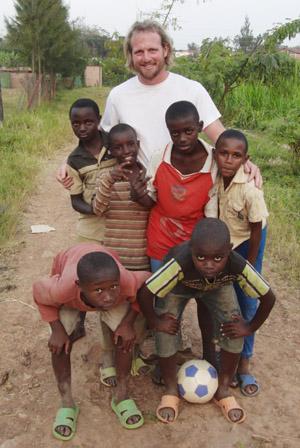
By Celine Klosterman
In an African country plagued by poverty, Mitchell Lincoln found spiritual riches.
The member of St. Joseph Parish in DeWitt learned a lesson in reliance on God during his yearlong trip to Rwanda, a nation where 60 percent of people live below the poverty line, according to the Central Intelligence Agency’s World Factbook.
“They don’t always know how they’re going to survive,” Lincoln said. “They’ll say, ‘I don’t know what I’m going to do tomorrow, but I’ve been praying a lot, and I know God’s going to take care of me.’”
Since returning in September 2010 from his volunteer trip to a Catholic youth home and vocational school in Rwanda, he’s tried to adopt their perspective. He sees that view as a lasting benefit of the journey, which he felt motivated to take after graduating from Coe College in Cedar Rapids in 2009 with a degree in political science.
“I grew up in the Church, and its social justice teachings really influenced me.” So Lincoln began seeking long-term volunteer opportunities. “I thought, ‘if you go for a couple weeks it’s kind of cheating.’” And he welcomed the challenge and commitment of volunteering outside the United States.
He settled on an opportunity with Salesian Missions, an organization run by the Salesians of Don Bosco that works to care for poor children worldwide. He initially asked to be placed in a program helping street children in Sierra Leone, but after that opportunity fell through, he accepted an opening to work with disadvantaged children in Rwanda’s capital of Kigali.
His first night there, he couldn’t sleep. “I was lying in bed thinking, ‘I’m really in Africa right now. Am I doing the right thing?’”
Day two brought more reason for uncertainty. A priest at Centre Des Jeunes, or Center For Youths, noticed Lincoln was from Iowa and thus assigned him to work on a farm that provides food for students and orphans. “I was like, ‘I’ll do it, but I’m not actually from a farm.’ He said, ‘You’ll figure it out.’”
Lincoln slowly did, thanks to some e-mailed guidance from his dad, Rick, a former farmer. “I could tell farming was in my blood because I started to like it,” the volunteer said with a laugh. He spent his days operating machinery and tending livestock and vegetable crops, often with the assistance of teen boys who worked in exchange for an education, meals or clothing.
He hopes he was more a mentor than a boss to the youths. Many of them lacked ties with an older male family member. By cultural norm, fathers are often absent; some students’ parents had been killed in the 1994 Rwandan genocide, and other families simply couldn’t afford to raise children. Also, “It’s not cool for an older brother to hang out with his younger brother.”
So Lincoln tried to be a friend. He’d listen to the struggles described by boys who had no money and teens who were trying to raise younger siblings after their parents died. He offered a gardening job to a young man named John who was desperate for income, and found shoes for some children. “But for the most part, I was just someone to be there and show love and support.”
Young people liked Lincoln very much, said Father Jean-Paul Lebel, a Salesian priest who ministers in the neighborhood of Gatenga that’s home to Centre des Jeunes. “He made quite a few friends with the Rwandan youths.
“He also gave a very good example of Christian life by going to Mass every Sunday and sometimes even on weekdays.” The Iowan’s farming contributions were especially appreciated, Fr. Lebel said.
“We were very happy to have him here… He was always cheerful and spread his good humor all around him.”
One person Lincoln shared that good cheer with was John. As the two grew close, the Iowan thought about him while hearing Gospel readings at Mass. “I was thinking, ‘Through John, right in front of me, God is revealing himself to me.’ The next day, John told me, ‘I see Christ is working through you.’ That was a really cool moment.”
Back in DeWitt, Lincoln said, he still draws inspiration from that experience and other encounters with people of faith.
He’s working for a seed corn company in his hometown and hopes to someday find a job, possibly in development, with a Catholic organization or an international non profit. Volunteering overseas taught him the joy of service, and being immersed in a different culture gave him perspective.
Rwandans “have fairly simple lives — no computers, cars or big houses. But they seem less stressed and tend to be grateful for the things they do have,” Lincoln said. “There’s a misconception that they’re happy because they don’t know any better — but they’ve seen TV and read books, and they know they’re poor. They’d like to be rich, but they’re content. So I take that away: be happy for what you have.”
Anyone who’s ever considered making a volunteer trip like his should do so, he said. “It’s a life-changing experience.”








